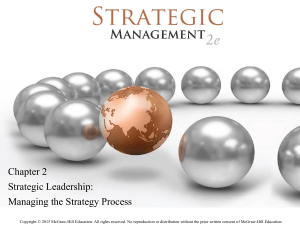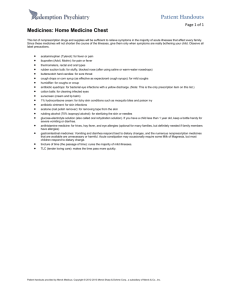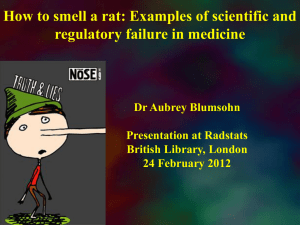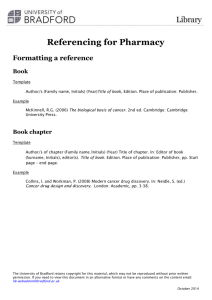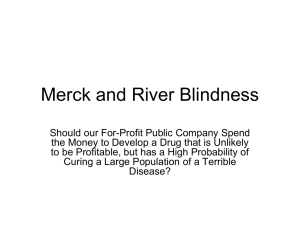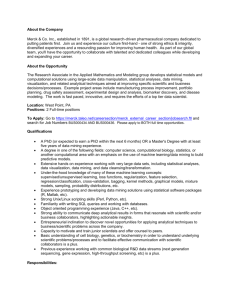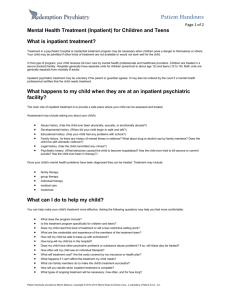Copied from the Washington Post as fair use
advertisement
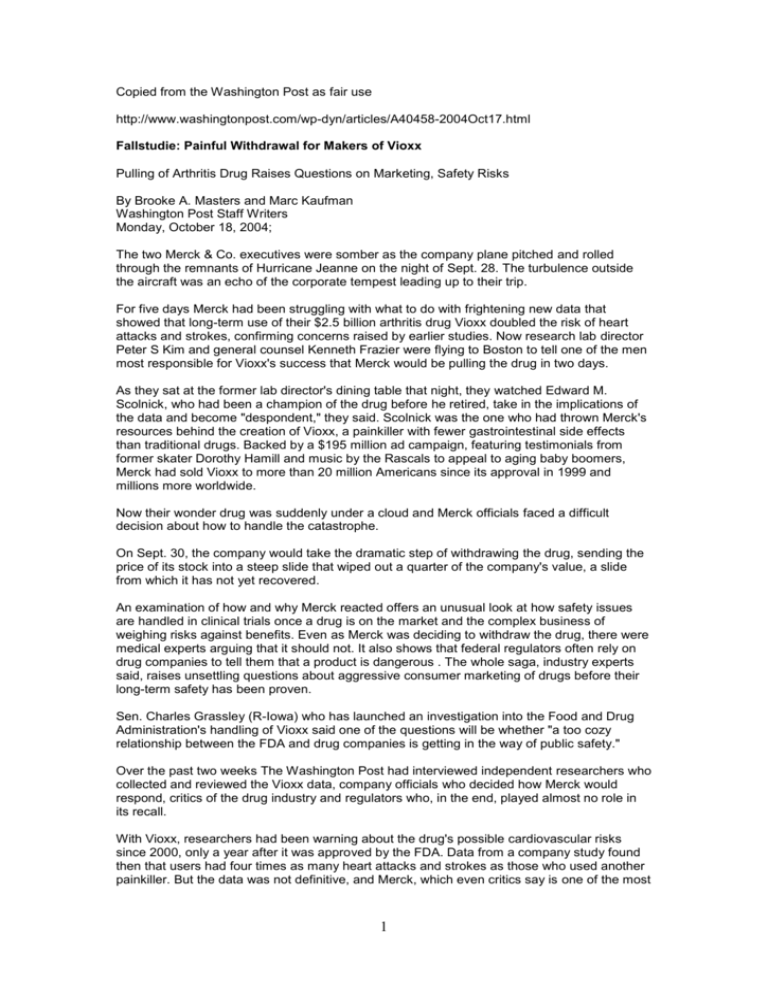
Copied from the Washington Post as fair use http://www.washingtonpost.com/wp-dyn/articles/A40458-2004Oct17.html Fallstudie: Painful Withdrawal for Makers of Vioxx Pulling of Arthritis Drug Raises Questions on Marketing, Safety Risks By Brooke A. Masters and Marc Kaufman Washington Post Staff Writers Monday, October 18, 2004; The two Merck & Co. executives were somber as the company plane pitched and rolled through the remnants of Hurricane Jeanne on the night of Sept. 28. The turbulence outside the aircraft was an echo of the corporate tempest leading up to their trip. For five days Merck had been struggling with what to do with frightening new data that showed that long-term use of their $2.5 billion arthritis drug Vioxx doubled the risk of heart attacks and strokes, confirming concerns raised by earlier studies. Now research lab director Peter S Kim and general counsel Kenneth Frazier were flying to Boston to tell one of the men most responsible for Vioxx's success that Merck would be pulling the drug in two days. As they sat at the former lab director's dining table that night, they watched Edward M. Scolnick, who had been a champion of the drug before he retired, take in the implications of the data and become "despondent," they said. Scolnick was the one who had thrown Merck's resources behind the creation of Vioxx, a painkiller with fewer gastrointestinal side effects than traditional drugs. Backed by a $195 million ad campaign, featuring testimonials from former skater Dorothy Hamill and music by the Rascals to appeal to aging baby boomers, Merck had sold Vioxx to more than 20 million Americans since its approval in 1999 and millions more worldwide. Now their wonder drug was suddenly under a cloud and Merck officials faced a difficult decision about how to handle the catastrophe. On Sept. 30, the company would take the dramatic step of withdrawing the drug, sending the price of its stock into a steep slide that wiped out a quarter of the company's value, a slide from which it has not yet recovered. An examination of how and why Merck reacted offers an unusual look at how safety issues are handled in clinical trials once a drug is on the market and the complex business of weighing risks against benefits. Even as Merck was deciding to withdraw the drug, there were medical experts arguing that it should not. It also shows that federal regulators often rely on drug companies to tell them that a product is dangerous . The whole saga, industry experts said, raises unsettling questions about aggressive consumer marketing of drugs before their long-term safety has been proven. Sen. Charles Grassley (R-Iowa) who has launched an investigation into the Food and Drug Administration's handling of Vioxx said one of the questions will be whether "a too cozy relationship between the FDA and drug companies is getting in the way of public safety." Over the past two weeks The Washington Post had interviewed independent researchers who collected and reviewed the Vioxx data, company officials who decided how Merck would respond, critics of the drug industry and regulators who, in the end, played almost no role in its recall. With Vioxx, researchers had been warning about the drug's possible cardiovascular risks since 2000, only a year after it was approved by the FDA. Data from a company study found then that users had four times as many heart attacks and strokes as those who used another painkiller. But the data was not definitive, and Merck, which even critics say is one of the most 1 responsible drug companies, repeatedly reassured the medical and financial communities that Vioxx was safe. Independent studies of Vioxx users continued to add to the questions, and the FDA began its own review. The safety officer who conducted it concluded this summer that the drug posed a serious risk. But he said that the results were ignored and that the FDA made efforts to silence him. When the recall occurred, it came about because of a major clinical study sponsored by Merck that tracked 2,600 patients for almost three years to find out if Vioxx helped prevent colon polyps. Merck launched the effort hoping to create new markets for Vioxx, while also laying to rest questions about the drug's connection to heart attacks and strokes. Far from it, the trial confirmed the predictions of Merck's harshest critics, who had long complained that the New Jersey manufacturer was closing its eyes to Vioxx's problems and improperly pushing a dangerous drug onto consumers with aggressive ads. Vioxx and other Cox-2 inhibitors like Celebrex had been promoted as wonder drugs, since they provided pain relief to arthritis sufferers without causing stomach problems, but now Vioxx is off the market and the others are under a cloud. Cleveland Clinic cardiologist Eric J. Topol, an early critic of the drug, estimates Vioxx may have caused 30,000 to 100,000 heart attacks and strokes, many of them "preventable" because patients could have taken other drugs. "Why didn't they stop the DTC [direct to consumer] marketing?" that was a major factor in increasing sales, he said. "That's the tragedy here." Data and a Decision to Make The last days of Vioxx began with FedEx deliveries on Sept. 14. That was when the four members of the colon polyp trial's Data and Safety Monitoring Board, an independent panel of specialists hired to catch harmful developments in the trial, received heart attack and stroke data for the previous six months. Most clinical trials include independent safety monitors, and their role is little understood but crucial. The four monitors, along with a Merck statistician were the only ones with full access to information about the trial, including which patients were getting Vioxx and which were getting the placebo. As a result, they alone were in a position to conclude the drug had proven too dangerous for the trial to continue. The same team also was monitoring another Merck trial to see if Vioxx might help protect against prostate cancer. A third trial was studying the drug's effect on colon cancer was also underway. All three trials were placebo-controlled and "blinded" to investigators, making them the most trusted kind of drug research. These studies also were designed to answer questions about cardiovascular risk raised by earlier less conclusive research. From the beginning of the colon polyp study, the safety monitors had noted an increased rate of hypertension among the Vioxx group. In addition, in 2003 and earlier this year, they found that more people in the Vioxx group were having cardiovascular events than in the placebo group. The numbers were small, in part because people with heart disease had been screened out of the trial, but the trend had been worrisome and the latest data were striking: After 18 months on the drug, the Vioxx group was clearly having more heart problems than the placebo group and the rate of difference was accelerating. "When I saw the last set of data, I knew we had a tough decision to make," said James Neaton, a University of Minnesota biostatistician, who had monitored a dozen other studies but seldom had seen such troubling data. "There was so much at stake for everyone involved. . . . You have to have data that the scientific community will accept." 2 Neaton and the three safety committee members spent several days studying the data, then held their regularly scheduled phone conference Sept. 17. They talked first with Merck representatives and the principal investigator for the colon polyp trial, John Baron of Dartmouth Medical School. Then Baron and the Merck people left the call, freeing the four safety panel members to talk openly about the latest unsettling data. Disturbing on its own, it also echoed less conclusive data from other trials. The experts agreed unanimously that the trial had to stop. "Coming to that conclusion, it took our breath way," Neaton said. Vioxx was Merck's fourth top seller, and they knew their decision would be extremely harmful to the company. Neaton immediately called Baron, who was conducting the trial with a grant from Merck, and explained the problem. When Neaton faxed him the "unblinded" data, the signal was clear: Within the small population of people suffering from cardiovascular disease, the number from the Vioxx group after 18 months of study was twice as high as the placebo group -- 15 heart attacks or strokes per 1,000 patients per year, versus 7.5 for the sugar pill. "I looked at it and concurred immediately that the trial should stop," Baron said. But first, Baron needed to get the approval of his steering committee of others involved in the trial. This took nearly a week, during which Baron took precautions to guard against leaks of negative information and insider trading of Merck shares. On Sept. 23 the full committee agreed to halt the trial. That afternoon, Baron called his contact at Merck to say that the drug presented an unacceptable risk of cardiovascular damage. Baron said in the next few days, as he presented the data to company officials and some outside Merck advisers, he experienced "no pushback at all." But then again, he said, "if an independent committee makes a recommendation like ours, only a fool would tell us to buzz off." Ominous Voice Mail Merck lab director Kim heard the news on when he dialed into his voice mail while driving to work, 7:30 a.m. on Sept. 24. "I was stunned," said Kim who had expected positive results. He and other Merck scientists poured over the data, looking for flaws but finding none. At midday, Kim got the general counsel Frazier on the line and called Raymond V. Gilmartin, Merck's chairman, president and chief executive. "The drug held up for three years. When you've been going this long you don't expect this kind of phone call," Gilmartin remembered in an interview soon after the drug was pulled. Merck critics, and there are many, say the company had plenty of warning. Yet Merck continued advertising. "There was so much denial over there," said David Moskowitz, senior pharmaceutical analyst for Friedman, Billings, Ramsey Co., noting that Merck officials were defending the drug to stock analysts just a few weeks before it was withdrawn. Last week, Gilmartin and Kim still said that none of the earlier Vioxx studies, by either the company or others, convincingly showed increased heart and stroke risk from the drug. As a result, they said, there was no reason to stop the advertising campaign. 3 "We were acting totally consistent with the data we had," Gilmartin said. "We undertook right away to ask the right questions." The company was trying to get at cardiovascular risk, he said, by initiating three clinical trials that would together give important new information on the issue. Many doctors and patients liked Vioxx's track record on gastrointestinal problems, a major source of worry for arthritis patients. But, on the phone call, when Kim delivered the new, more damaging results, Gilmartin's choices were bleak. Even if the painkiller stayed on the market, sales would almost certainly plummet because its advertising would be restricted and would have to carry a "black box" warning about the heart attack risks. Gilmartin was clear that the trial should be halted and that the drug might have to be taken off the market . "Look Peter, we're going to make this decision based on what's in the best interest of science and patient safety," Gilmartin recalled saying. "It's not that we're unaware of the consequences, but it's a deep-seated belief that if you do the right thing, rewards will follow," he said of the decision to pull the drug. The decision was also sound litigation strategy. The company was already facing two class action lawsuits alleging patient harm from Vioxx. Anything that smacked of a cover-up would have strengthened the plaintiffs' hands. "Running away from your problems, denial, is the worst possible choice," said Anthony M. Sabino, professor of business law at St. John's University. Over the next three days, Kim and his researchers convened three teleconferences with about 15 outside medical experts to get their advice. By then, Kim said, he was leaning toward pulling the drug. But the outside experts, most of whom had done previous work with Merck and were offered a fee for their consultation, had surprisingly mixed opinions. A sizeable group were reluctant to give up a painkiller proven to have fewer gastrointestinal side effects than others and were not convinced the available alternatives were any safer, participants said. (On Friday, Pfizer Inc. issued a warning that its Cox2 drug Bextra may increase cardiovascular risk for some patients.) Duke University cardiologist Robert Califf argued strenuously on one teleconference for keeping the drug on the market with a much stronger warning label. He had been railing publicly for some time about the absence of longterm cardiovascular risk studies on painkillers, a situation that he said made selecting the right drug a "total crapshoot." In his view, the new Vioxx data quantified the risk and made it manageable. "The curves show not even a hint of a detrimental effect for 18 months," and even after that the risks did not appear that large. "I thought the risk was going to be larger than it was," he said. "It should stay on the market as an alternative." But Northwestern University rheumatologist Thomas G. Schnitzer argued for ditching Vioxx entirely because Merck's scientists could not explain why the drug started causing heart attacks after 18 months. Furthermore, Merck's carefully cultivated image would go out the window if Vioxx stayed on the market, he said, because Merck "prides itself on its ethical approach. I couldn't see Merck saying we're going to market a drug with a safety problem." At lunchtime on Monday, Sept. 27, it was time to make a final decision. Kim, Frazier and Gilmartin gathered in the chief executive's conference room overlooking Merck's wooded campus in Whitehouse Station, N.J. The lab director's message came in two parts: the experts were divided over whether Merck had to pull Vioxx off the market, but Kim thought they should do it anyway. Gilmartin said he agreed the drug should be pulled but wanted to take a decision of that magnitude to his board of directors who concurred when they met the next day. By then, Merck had notified the FDA that it needed an emergency meeting that afternoon, and asked that top officials be present. 4 In the meeting, top FDA officials were shown preliminary slides from the colon polyp study and were told by Merck that the drug would be withdrawn. The FDA Center for Drug Evaluation and Research director Steven Galson said there was discussion of keeping the drug for short-term use, but the company did not think it was practical. Fearful of a leak, Merck officials waited until the next day, Wednesday, to tell international affiliates of the planned withdrawal and asked them to hold off on telling their regulators until the news was made public. Three Merck officials sat up all night Wednesday answering emails and phone calls from the foreign medical directors. Withdrawal day started early, with an 4 a.m. e-mail to Merck's 60,000 employees alerting them to a major announcement. At 9 a.m. on Sept. 30, Gilmartin and Kim took the stage at the Hilton Times Square and faced a room packed with reporters and television cameras. "This morning Merck is announcing a voluntary worldwide withdrawal of Vioxx," Gilmartin began. Warning From the FDA Since the Merck decision, public health advocates and some congressional leaders have asked pointedly why the FDA, the nation's arbiter of drug safety, did not act sooner itself. The FDA's Galson said that his agency met often with Merck to discuss earlier troubling Vioxx studies, and said that "we insisted that we needed more information about the cardiovascular risks." In 2001, the agency formally warned the company against misleading doctors about those risks, and in 2002, the FDA required stiffer wording on the drug label. Nonetheless, the agency had agreed with Merck that the 2000 study had too many confounding aspects to be definitive. The national adverse event reporting system that helps the FDA flag dangerous side effects was of little use in this case because the ailments possibly caused by Vioxx -- heart attacks and strokes -- are so common. Galson also said that Vioxx safety follow-up was complicated by the fact that it is unethical to give placebos to arthritic patients, because their pain needs treatment. Instead the FDA strongly supported the Merck decision to use three placebo-controlled trials in healthy people to test whether the drug was protective against prostate and colon cancer and colon polyps and also to study cardiovascular risk. The FDA's own study of the Vioxx safety issue has become mired in controversy. The FDA safety officer in charge of the report, David Graham, concluded that Vioxx posed much greater cardiovascular risk than the other major drug in its class, Celebrex. He presented that information at a French conference this summer. Galson has said, however, that he only saw a short abstract of the study and so could not act on its conclusions, a contention that Graham disputes. The controversy grew on Friday when Grassley asked Merck, among other things, about an e-mail provided by Graham in which a Merck official complained that the FDA had not lived up to a prior agreement to alert the company before releasing any negative information about its products. The FDA's opportunity to act independently on Vioxx ended on Sept. 27, when the fax came from Merck asking for an urgent meeting with senior officials. The next day surprised FDA officials learned the drug would be pulled. Despite the criticism directed at his agency, Galson remains unapologetic. "We did the right things based on what we knew at the time," he said. But taking the drug off the market, he said, was the right thing, too. 5
